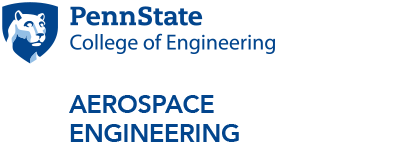Maughmer named American Institute of Aeronautics and Astronautics Fellow
3/1/2018
UNIVERSITY PARK, Pa. — Mark D. Maughmer, professor of aerospace engineering at Penn State, has been named an American Institute of Aeronautics and Astronautics (AIAA) Fellow.
AIAA Fellows are “persons of distinction in aeronautics or astronautics who have made notable and valuable contributions to the arts, sciences, or technology thereof.”
Maughmer was cited for his contributions to aerodynamic research and design, the education of engineers and mentoring of outstanding graduate students, all to the benefit of the aerospace community.
“I am humbled and honored to be named an AIAA Fellow,” said Maughmer. “While we don’t work for such awards, the most gratifying of all is to be recognized by one’s peers. I also cannot express appreciation enough to my friends and colleagues for the time and effort put forth on my behalf to secure this recognition.”
For more than 40 years, Maughmer’s research activities have centered on the aerodynamic design and performance of flight vehicles, both fixed wing and rotorcraft. While the focus of his research is applied, it covers the spectrum of being analytical, computational and experimental. His work has ranged from fundamental research, such as developing improved models of laminar separation bubbles and transition prediction, to the development of design tools, including his work on induced drag prediction and inverse design methods, to the practical design of aircraft components that are in widespread production.
Maughmer’s work in the development of airfoil design tools is well known, as are his airfoil designs, which have been employed on a number of low-speed aircraft and sailplanes. He is also a pioneer in winglet design, and his winglets have been employed on hundreds of production sailplanes, conferring significant improvements in cross-country speed, handling qualities and stall behavior. Additional aircraft, such as low-speed surveillance types, a number of general-aviation designs and Nigel Lamb’s Red Bull MSX-R racing aircraft that won the Red Bull Air Race World Championship in 2014, have also benefited from the winglet heritage and design tools developed for sailplanes. In the rotorcraft area, among his contributions, he was the first to introduce small, deployable tabs (Gurney flaps) near the trailing edge of rotor blades to improve overall rotorcraft performance.
A Penn State faculty member since 1984, Maughmer has been recognized with numerous awards for his teaching and research, including the AIAA Sustained Service Award, AIAA J. Leland Atwood Award, AIAA Piper General Aviation Award, Penn State Engineering Alumni Society (PSEAS) Outstanding Teaching Award, PSEAS Premier Teaching Award, Penn State Alumni Association Teaching Fellow Award, American Society for Engineering Education (ASEE) Fred Merryfield Design Award and a National Aeronautics and Space Administration Group Achievement Award.
Of Maughmer’s many contributions to education at Penn State, his project-based teaching and mentoring are noteworthy. In 1989, he co-created and pioneered the first long-term, project-based experience for engineering students, the Flight Vehicle Design and Fabrication course, dubbed by students as the “sailplane class.” He has taught this class, comprised of first-year students through seniors working together throughout all four years of their undergraduate programs, since its inception. To enable students to broaden their aeronautical and engineering skills, the class combines traditional classroom lectures with hands-on shop, hangar and airfield experiences. Originally focusing on the design and fabrication of sailplanes, the course now includes the design, building and flying of prototype human-powered aircraft for entry in the Kremer International Sporting Aircraft competition.
Since 2005, Maughmer has served as the faculty adviser for the Penn State AIAA Design-Build-Fly competition team, and his involvement with AIAA spans years. Currently, he is the chair for the organization’s Central Pennsylvania Professional Section, and he has participated as a session chair for numerous national conferences, volunteered as a technical judge for regional and national student competitions and was a member of the Aircraft Design and Technical Committee.
Maughmer is also a member of the American Helicopter Society and ASEE, and is the current vice president for the International Organization for the Science and Technology of Soaring.
In the merging of his career and hobbies, Maughmer has been an active glider pilot since 1972, a glider flight instructor since 1976 and the faculty adviser for the Penn State Soaring Club for nearly three decades. He currently owns and flies a Ventus 2bx high-performance sailplane, as well as a 1946 Piper J-3 Cub.
Maughmer, along with the other recipients of the 2018 Fellow Award, will be honored and formally inducted at the AIAA Aerospace Fellows Dinner on May 1, and celebrated at the Aerospace Spotlight Awards Gala on May 2, at the Ronald Reagan Building and International Trade Center in Washington, D.C.




